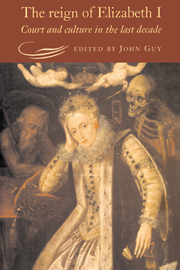Book contents
- Frontmatter
- Contents
- List of figures
- Preface
- List of contributors
- List of abbreviations
- Introduction The 1590s: the second reign of Elizabeth I?
- 1 The patronage of the crown in Elizabethan politics: the 1590s in perspective
- 2 Regnum Cecilianum? A Cecilian perspective of the Court
- 3 Patronage at Court, faction and the earl of Essex
- 4 Peers, patronage and the politics of history
- 5 The fall of Sir John Perrot
- 6 The Elizabethan establishment and the ecclesiastical polity
- 7 Ecclesiastical vitriol: religious satire in the 1590s and the invention of puritanism
- 8 Ecclesiastical vitriol: the kirk, the puritans and the future king of England
- 9 Social strain and social dislocation, 1585–1603
- 10 Lord of Liberty: Francis Davison and the cult of Elizabeth
- 11 The complaint of poetry for the death of liberality: the decline of literary patronage in the 1590s
- 12 Summer's Last Will and Testament: revels' end
- 13 The theatre and the Court in the 1590s
- Index
9 - Social strain and social dislocation, 1585–1603
Published online by Cambridge University Press: 06 January 2010
- Frontmatter
- Contents
- List of figures
- Preface
- List of contributors
- List of abbreviations
- Introduction The 1590s: the second reign of Elizabeth I?
- 1 The patronage of the crown in Elizabethan politics: the 1590s in perspective
- 2 Regnum Cecilianum? A Cecilian perspective of the Court
- 3 Patronage at Court, faction and the earl of Essex
- 4 Peers, patronage and the politics of history
- 5 The fall of Sir John Perrot
- 6 The Elizabethan establishment and the ecclesiastical polity
- 7 Ecclesiastical vitriol: religious satire in the 1590s and the invention of puritanism
- 8 Ecclesiastical vitriol: the kirk, the puritans and the future king of England
- 9 Social strain and social dislocation, 1585–1603
- 10 Lord of Liberty: Francis Davison and the cult of Elizabeth
- 11 The complaint of poetry for the death of liberality: the decline of literary patronage in the 1590s
- 12 Summer's Last Will and Testament: revels' end
- 13 The theatre and the Court in the 1590s
- Index
Summary
On 25 September 1596 Edward Hext, a justice of the peace in Somerset, wrote to Lord Burghley about the imminent breakdown of social stability in that county. Hext's letter was a litany of complaints about the threats to law and order. At the base of the problem, of the ‘rapynes and thefts’ which ‘multiplye daylye’, lay a body of ‘wycked and desparate’ persons, idle ne'er do wells who ‘beinge putt to any hard labor, will greve them above measure, so as they will rather hazard their lives than work’. To the vagrants, rogues and sturdy beggars who were the standard target of adverse comment in the late-Elizabethan period were added ‘wandring souldiers and other stout roages’, of whom, according to Hext, there were three or four hundred in every county. These were so well organized and well informed (‘nothing is spoken, donne, or intended to be they knowe it’) that it was very difficult to apprehend them. In an early suggestion that it might be desirable to gather national figures on crime and punishment, Hext advised Burghley ‘for the good of your cuntry to comaund a view of the callenders of all the gayles of England’, within which documents there would be found ‘a lamentable estate’.
- Type
- Chapter
- Information
- The Reign of Elizabeth ICourt and Culture in the Last Decade, pp. 192 - 211Publisher: Cambridge University PressPrint publication year: 1995
- 20
- Cited by



